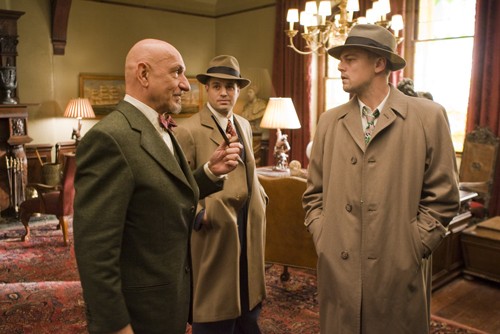From the initial discordant shout of classical music, “”Shutter Island”” makes its tone obvious — portentous and epic. Stemming from a novel of the same name and masterfully conducted by Martin Scorsese, the film takes the much-beloved genre of mystery and adds the slinky touch of classic film noir to form a story that will keep you genuinely entertained until the theater lights come back up.
Set in 1954, “”Shutter Island”” chronicles Leonardo DiCaprio as Teddy Daniels, a U.S. Marshal investigating a patient’s disappearance at Shutter Island, a mental hospital for the criminally insane. The diminutive island is ominous and the staff is even more enigmatic. Ben Kingsley portrays the chief physician, Dr. John Cawley, whose small smiles glint like knives.
As Teddy scours the rocky bluffs for an escaped patient, his past slowly emerges to reveal a glorious backdrop of trauma that both defines and destroys his psyche. His past military infiltration of a Nazi concentration camp mingles with the recent death of his wife to drive Teddy onward in an attempt to grasp at a solution to his tribulations. Though DiCaprio might look like a frustrated pug at times, his performance is sturdy and he rushes headlong with the audience through a myriad of explanations for all the crazy phenomena surrounding him. Kingsley repeatedly exposes different lenses through which to view the enigma, enabling the investigation to continue while simultaneously presenting numerous obstacles to the final unanticipated truth.
“”Shutter Island”” registers deeply on a sensuous level. The score ranges from grand orchestral numbers to searing saws that will further raise the lump in your throat. Torrential storms utterly control the rough island with terrible beauty. The drip-drip of water in an empty hallway leaves you eagerly awaiting the next opportunity to jump in your seat. Numerous characters with mental disorders coupled with confusing ghostly signs create more dead ends than a game of Clue. In the background a lighthouse looms, hinting at some fate that both draws and repels.
It might not be Scorsese’s best work compared to “”Taxi Driver”” (1976) and “”The Departed”” (2006), but it appears that he’s trying more to entertain than to make imposing statements. Movie buffs can appreciate the Hitchcock-esque staccato camera shots and multiple plot reversals. Though the plot is not particularly fresh, the storytelling ultimately becomes more intriguing than the story itself. There are only so many tricks in the book, and “”Shutter Island”” unashamedly masters all of them.
Don’t watch “”Shutter Island”” if you suffer from any of the following conditions: An abnormal fear of rats, jagged heights or nastily delicious psychotic people. “”Shutter Island”” is specifically formulated to treat boredom, empty weekends and milder cases of cinephilia. Side effects include laughter, quick thinking and dropped jaws upon watching the final scenes. But be forewarned — it may even induce a second viewing.









